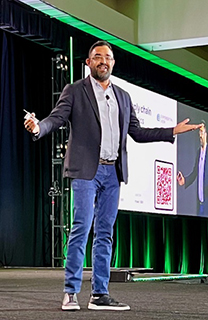Tuesday's Keynote: Azeem Azhar Outlines the AI Opportunity for Supply Chains
Print this Article | Send to Colleague
 |
Azeem Azhar's keynote on Tuesday morning shed light on the transformative power of AI and robotics for the supply chain industry. Azhar, considered one of the world’s most influential thinkers on the impact of technology on humanity, is the founder of the 'Exponential View' newsletter and podcast, and is also a researcher, investor and entrepreneur.
Azhar began by acknowledging the challenging years supply chain industries have faced, with disruptions caused by the COVID-19 pandemic, supply chain bottlenecks like the incident in the Suez Canal, and ongoing geopolitical tensions. Despite these challenges, the emergence of AI presents an opportunity for supply chains to evolve and thrive in a more complex world.
The key theme of the talk was the exponential growth in AI's capabilities, driven by advancements in machine learning and robotics. Azhar pointed out that the rapid evolution of AI systems — from simple tools to intelligent agents capable of performing complex tasks — has made AI an increasingly vital part of the business landscape. He noted that the cost of AI technology has fallen dramatically, with some systems dropping in price by up to 900-fold, making them accessible to a wide range of organizations.
In exploring AI's impact on supply chains, Azhar discussed the rise of intelligent AI agents. These agents are designed to perform tasks that traditionally required human thinking, such as problem-solving, decision-making and acting on those decisions. Unlike earlier AI systems, which were highly specialized, these agents offer a much broader range of capabilities, from automating data analysis to synthesizing complex information. He gave the example of how, in his own experience, AI tools have become indispensable in his daily work, surpassing traditional search engines like Google for information retrieval and task automation.
Azhar also addressed the rapid growth in AI adoption across industries. He cited impressive statistics, such as the sharp increase in the number of tokens (a measure of AI usage) being generated by businesses and consumers alike. This surge in AI utilization is further evidenced by massive capital investments from tech giants in AI infrastructure. Between 2021 and 2025, companies like Amazon and Google are projected to spend over $300 billion on servers and data centers to support AI advancements, signaling the increasing importance of AI in the business world.
Despite the buzz around AI, Azhar cautioned that the technology is still in its early stages, and its capabilities are continuously evolving. Drawing comparisons to past overhyped technologies like the metaverse and blockchain, Azhar emphasized that AI, unlike these past trends, is already delivering tangible business value. He underscored the importance of recognizing the dynamic nature of AI and its rapid improvement, particularly in terms of agents and robotics, which are increasingly capable of taking on complex tasks traditionally reserved for humans.
In terms of robotics, Azhar highlighted recent breakthroughs in autonomous systems, particularly self-driving cars, which represent a significant step forward in the integration of AI with physical infrastructure. He pointed to the potential for AI-powered robots to revolutionize supply chains, making them more efficient and resilient by automating tasks such as inventory management and delivery logistics.
Azhar wrapped up his talk by emphasizing that businesses should be preparing for a rapidly changing landscape, where AI continues to evolve at an exponential pace. He noted that AI systems are already becoming more general and capable of handling a wider range of tasks. By 2027 or 2028, it is expected that AI models will be capable of performing the work of an average employee. As a result, organizations must stay agile and adapt to these advances to remain competitive in the ever-changing supply chain landscape.
The presentation concluded by exploring how advancements in context windows, machine intelligence, and robotics are rapidly transforming business operations. As context windows expand to accommodate millions of words, companies can process vast amounts of data, shifting from point-specific problems to system-wide solutions. This ability to analyze large volumes of customer feedback at once helps businesses identify commonalities, successes and areas for improvement on a much larger scale.
In addition, the cost of machine intelligence has dramatically decreased, with some of the smartest models becoming 900 times cheaper in a single year. This shift opens up new possibilities for businesses to run multiple AI systems simultaneously, increasing efficiency and lowering costs across various processes.
The speaker emphasizes that while AI agents, which can handle more complex tasks, are still in development, they present an exciting future for business operations. A key point was the potential of humanoid robots in logistics, which could significantly reduce costs and make supply chains more efficient. As robot technology advances, it promises to change the economics of industries like logistics, opening up new possibilities for automation at lower costs.
Despite the rapid advances in AI and robotics, the supply chain industry lags in adopting these technologies. However, this creates significant opportunities for growth and innovation. The speaker concludes by urging businesses to first implement AI tools for foundational processes such as documentation, customer support, and planning, while also preparing for the future by experimenting with AI agents and developing a robotics strategy. The rapid pace of change in AI and robotics promises a revolution that will transform industries, and businesses must adapt quickly to stay competitive.

